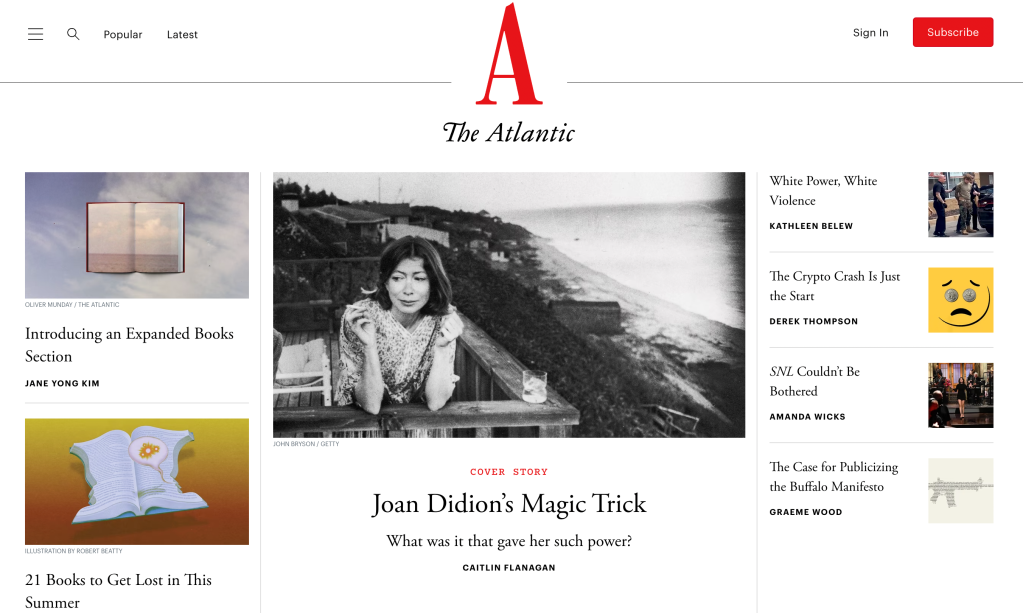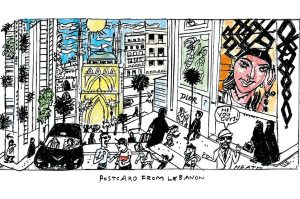The Atlantic’s expanded books section
The Atlantic has announced it is expanding its books section. Reading can be revelatory, Jane Yong Kim writes in her note on the news. “Reading about books can have a similarly revelatory effect.” Do tell.
Kim goes on. She trots out all the clichés about reading today as reasons for, well, reading — not a particularly auspicious start. Reading “has a unique quality of slowing us down even as it widens our horizons,” she writes. Books are a “vehicle for the free expression of ideas,” and free expression, in case you haven’t noticed, is under attack. But the expanded books section at the Atlantic, Kim tells us, is going to be a place where unpopular ideas will finally be given a hearing. All of those ignored books about how we are living in a climate crisis and about how young people are exploring their identity “in new ways” will finally be reviewed in a national publication.
It’s about damn time. Here’s Kim to give you a sense of how fresh this books section is going to be:
Novelists are grappling, creatively, with the climate crisis, alleged predatory behavior, the future of work. Poets are taking on crucial questions of identity. Anthropologists are rethinking our assumptions about human social history, writ large. Earlier texts, too, when revisited, can offer historical context that resounds sharply decades later. Reading can show us, anew, the forces that shape our institutions, our beliefs, and our sense of self. It can expand the way we look at the world around us. At The Atlantic, our aim has been, and will be, to introduce readers to such books, old and new, and to engage with the ideas in them critically and inquisitively.
Books “can expand the way we look at the world around us,” but clearly they don’t always.
I’m not against another (or larger) books section — we have lost quite a few over the past twenty years — but what we need are better books sections. We need books sections run by editors who know that no introductory note is needed to remind readers how “relevant” books are. Real readers already know this, and they also know that the best books are “relevant” in completely unanticipated ways. We don’t need books sections that feel the need to defend the value of reading. We need ones that assume it and get on with the business of commissioning and editing.
In other news
Evelyn Statsinger’s otherwordly art: “If her early works were imbued with dark, quiet intensity, the art in this show is the near-opposite. There is still intense feeling, and perhaps quiet — they demand their viewers’ whole, unchattering focus — but dark they most certainly are not.”
The Public Discourse is running a series of essays on the work of the late Peter Augustine Lawler. What would Peter have made of the turn — the mess — in conservative politics over the past five years? His voice is sorely missed. Here’s the first piece.
How have we gotten to the place where even the word “homeless” is objectionable? David Skinner proposes what he calls the “reasonable nonaligned bystander test” for determining if we should stop using certain words: “Do you possibly sound to a person of a different point of view like someone in the grip of an irrational idea about the power of trivial word substitutions?”
The Guardian asks “Are NFTs really art?” Answer: yes, bad art.
Netflix comes out in support of artistic freedom in a memo.
One more item from the Everything-is-Terrible-and-it’s-Getting-Worse desk: Mark Judge’s father was a senior editor at National Geographic. It used to be a great magazine. Not anymore: “National Geographic once represented the open mind and questing heart of classical liberalism at its best. Now, it’s content with woke platitudes.”
“We don’t easily think of George Orwell as a comic writer. We also don’t think of him principally as a writer of novels, though he wrote six, including Animal Farm and 1984, the books that earned him enduring fame. The novel as a form claims a degree of irresponsibility or disinterestedness inconsistent with our idea of the man who created Room 101.” But he is, Jonathan Clarke argues, in City Journal.
Peter Hitchens on ferries:
I wish there were more ferries. They transform a journey into an adventure and they give a place a mystery. What is it like on the other side? What if I am too late and cannot cross? How would it be, to be pursued, and to leap on to the ferry just in time to escape my pursuers, left standing and mouthing threats on the shore? I especially remember the Gosport Ferry that still crosses the narrow entrance of Portsmouth Harbour many times a day.
Benjamin Schreier against the graduate school letter of recommendation: “Letters of recommendation are mostly a waste — a predictable exercise that leaves us feeling just a little more self-loathing than we did before.”
Marc Mulholland reviews Vic Gatrell’s Conspiracy on Cato Street: A Tale of Liberty and Revolution in Regency London:
On 23 February 1820, a party of soldiers and watchmen swooped on a huddle of men in dingy quarters on Cato Street, near Edgware Road in London. There was a brief but desperate struggle by the light of guttering candles. Constable Smithers was run through with a well-aimed sword thrust by Arthur Thistlewood and died almost immediately, but the twenty or so men present were quickly taken into custody. Within hours, the news spread. A grimy gang of desperadoes had been captured just in time to stop them setting out on an assassination plot of shocking audacity.


















